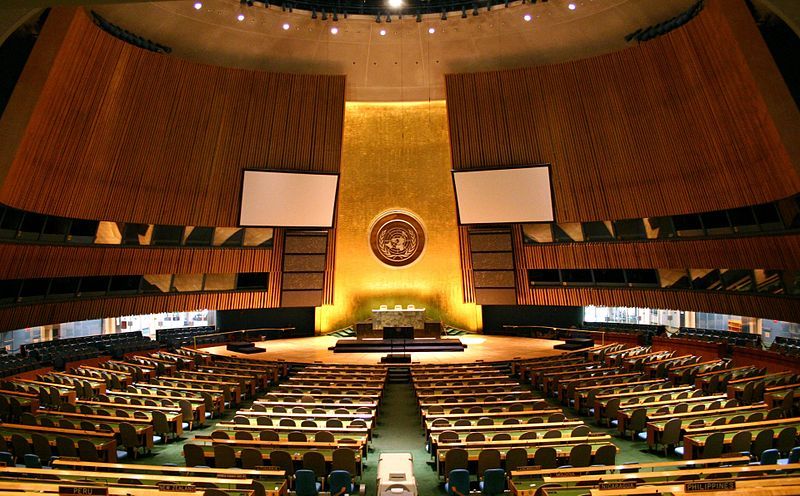
#EyesOnIdlib: Prioritizing Syria at the UN General Assembly
The UN General Assembly Hall in New York City, where the high-level week will take place this month. Source: Wikimedia
Next week, heads of state and foreign ministers will gather at the United Nations in New York for the annual high-level week during the 73rd session of the UN General Assembly. In the backdrop of the meetings will be the impending humanitarian crisis in Idlib. The 3 million residents of Idlib remain threatened by the looming offensive to retake the last rebel-held territory in Syria. The Syrian government has been amassing troops on the outskirts of rebel-controlled territory and dropping leaflets warning of an impending attack. The residents of Idlib remain particularly vulnerable due to the area’s high population density and lack of infrastructure, and more than 30,000 have already been displaced by an initial bombardment campaign. In response to a rapid escalation of threats by the Syrian government, residents of Idlib have taken to the streets on two consecutive Fridays demanding, among other things, international protection from the threat posed by the Syrian government. More than half of Idlib’s current residents are displaced from other areas, and are expressing resentment of the repeated threats to their safety. One resident of Idlib explained, “I have spent my last years crumbling from one place to another, running away from the intense clashes and bombardment.” Another articulated frustration at the prospect of having to relocate yet again: “I have to save my family. All we want is to stay in our homes and live our lives.”
Last week, the UN Special Envoy and other concerned states emphasized the need to place pressure on the parties to the conflict to reach a political settlement to the situation in Idlib. On September 7th, the presidents of Turkey, Russia and Iran met in Tehran, though no agreement was reached. Simultaneously, the UN Security Council held an emergency session, during which UN Special Envoy de Mistura briefed the Security Council from Geneva and member states, including the US and France, and urged Syria and Russia to refrain from indiscriminate attacks on civilian areas and warned against the use of chemical weapons. Similar warnings were expressed during the Security Council’s second session on Idlib on September 11th. Despite the focus on Idlib, UN Special Envoy de Mistura continued plans for Astana-track discussions of Syria’s constitutional committee on Tuesday in Geneva. Discussions in previous Astana meetings have seemed oblivious of the reality of the situation in Syria. The Special Envoy’s emphasis should be on halting hostilities as a prerequisite to constitution-related discussions.
During the upcoming week at the UN, the situation in Idlib must be a central topic of discussion. The international community faces a myriad of pressing issues to discuss during the high-level week, including Yemen and Myanmar. Increasing fatigue with regard to the Syrian conflict and resulting refugee crisis could lead states to accept Syrian and Russian rhetoric that the conflict is ending. European states continue to face pressure to return refugees, with heavy influence from various right-wing parties in Europe. Additionally, SJAC has highlighted the various ways in which the Syrian government has attempted in recent months to “resolve” issues related to the conflict on its own arbitrary and unjust terms, including issuing death certificates en masse for those who died in Syrian prisons and dealing with the issue of property restitution through Law No. 10. But the international community should not be tempted by the illusion that the conflict is nearing a close, particularly at a time when the potential for an extensive aerial assault and ground battle risks causing even greater instability and displacement in Idlib.
While SJAC recognizes that there are numerous issues for states to undertake next week, Syria remains a critical topic for the international community. To this end, SJAC calls on states to undertake the following during the high-level week:
1) Express a strong commitment to Geneva-track negotiations in line with Resolution 2254. Similarly, states should ensure that Astana talks do not overshadow the need for a political settlement to the situation in Idlib, as a constitutional committee will not succeed in conjunction with an ongoing military campaign.
2) Prioritize the protection of civilians in Idlib. Instead of immediately resorting to evacuations or population transfers that have not previously been peaceful or voluntary, states should press the parties to the conflict to refrain from the use of indiscriminate weapons or the deliberate targeting of civilian areas. Genuine efforts to achieve a ceasefire agreement must take precedence over paving the way for reckless military action.
3) Demand a robust monitoring mechanism as part of any negotiated ceasefire agreement to ensure compliance with all provisions of the agreement. Civilians in Syria know all too well that previous ceasefires have been violated with no consequences, such as in Aleppo in December 2016, Deraa in July 2017, and Eastern Ghouta in February 2018.
4) Call for those responsible for atrocities in Syria to be held accountable and request for the IIIM to provide a substantive update of its activities and progress during the past year.
Many issues will be competing for attention at the UN next week, but the plight of Syria, and specifically the civilians of Idlib, must not be sidelined.
For more information or to provide feedback, please contact SJAC at [email protected] and follow us on Facebook and Twitter.